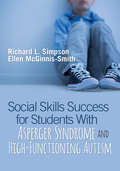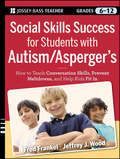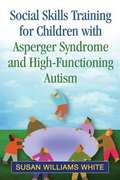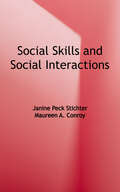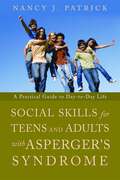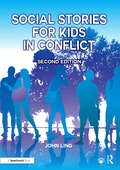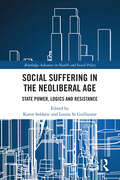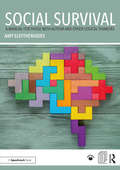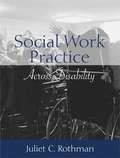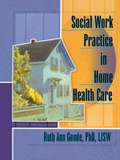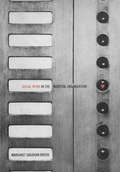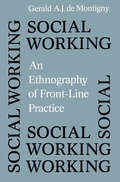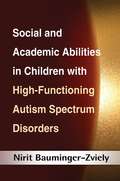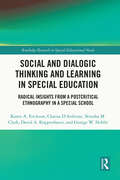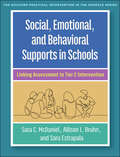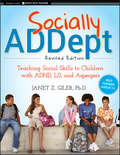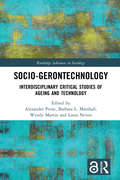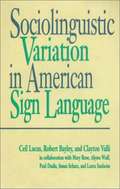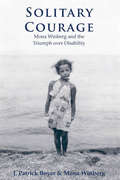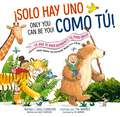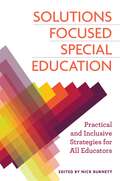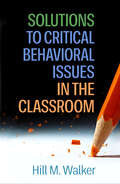- Table View
- List View
Social Skills Success for Students With Asperger Syndrome and High-Functioning Autism
by Richard L. Simpson Ellen McGinnis-SmithProvide students the social skills instruction they need to succeed in school and in life! Students on the autism spectrum have so much to offer our schools and communities, but they often aren’t provided with sufficient opportunity to develop to their full potential. This practical resource offers down-to-earth methods and strategies backed by evidence for enhancing the social skills of children and adolescents who have Asperger Disorder and other forms of high-functioning autism. Case studies, vignettes, classroom materials, checklists, and templates will help you: Deliver interventions that model desirable behaviors and provide opportunities for students to practice Support students in navigating social situations, forming relationships with peers and adults, and following rules and routines Develop, implement, and evaluate social skills intervention and support programs Educators and specialists will appreciate how this practical and friendly resource approaches each student as a unique learner and offers ways to build multi-faceted social skill intervention and support plans for each one. "Packed with practical, research-based activities, this book is the answer for teachers and parents. Educators will find value in the detailed processes and activities as well as the ready-to-use materials." —Renee Bernhardt, Supervisor of Special Education Cherokee County School District, Canton, GA "This is an up-to-date, practical, and practitioner-friendly resource for developing, implementing, and evaluating social skill intervention and support programs." —Debi Gartland, Professor of Special Education Towson University
Social Skills Success for Students With Asperger Syndrome and High-Functioning Autism
by Richard L. Simpson Ellen McGinnis-SmithProvide students the social skills instruction they need to succeed in school and in life! Students on the autism spectrum have so much to offer our schools and communities, but they often aren’t provided with sufficient opportunity to develop to their full potential. This practical resource offers down-to-earth methods and strategies backed by evidence for enhancing the social skills of children and adolescents who have Asperger Disorder and other forms of high-functioning autism. Case studies, vignettes, classroom materials, checklists, and templates will help you: Deliver interventions that model desirable behaviors and provide opportunities for students to practice Support students in navigating social situations, forming relationships with peers and adults, and following rules and routines Develop, implement, and evaluate social skills intervention and support programs Educators and specialists will appreciate how this practical and friendly resource approaches each student as a unique learner and offers ways to build multi-faceted social skill intervention and support plans for each one. "Packed with practical, research-based activities, this book is the answer for teachers and parents. Educators will find value in the detailed processes and activities as well as the ready-to-use materials." —Renee Bernhardt, Supervisor of Special Education Cherokee County School District, Canton, GA "This is an up-to-date, practical, and practitioner-friendly resource for developing, implementing, and evaluating social skill intervention and support programs." —Debi Gartland, Professor of Special Education Towson University
Social Skills Success for Students with Autism / Asperger's
by Fred Frankel Jeffrey J. WoodThe only evidence-based program available for teaching social skills to adolescents with autism spectrum disorders Two nationally known experts in friendship formation and anxiety management address the social challenges faced by adolescents with autism spectrum disorders (ASD). The book helps educators instruct youth on conversing with others, displaying appropriate body language, managing anxiety, initiating and participating in get-togethers, and more. The book is filled with helpful information on ASD to aid teachers who have received little training on the topic. Extremely practical, the book includes lesson plans, checklists, and sidebars with helpful advice. Based on UCLA's acclaimed PEERS program, the only evidence-based approach to teaching social skills to adolescents with ASD Contains best practices for working with parents, which is the key to helping kids learn social skills The authors discuss the pros and cons of teaching students with ASD in educational settings like full inclusion (good for academics but bad for social skills) and pull-out special day classes (where the reverse is true) Provides a much-needed book for teachers at all levels for helping students develop the skills they need to be successful.
Social Skills Training for Children with Asperger Syndrome and High-Functioning Autism
by Susan WhiteThis practical, research-based guide provides a wealth of tools and strategies for implementing social skills training in school or clinical settings. Numerous case examples illustrate common social difficulties experienced by children with Asperger syndrome and high-functioning autism; the impact on peer relationships, school performance, and behavior; and how social skills training can help. Chapters delve into the nuts and bolts of teaching and reinforcing core skills in classroom, small-group, or individual contexts, emphasizing ways to tailor interventions to each individual's needs. Reproducible forms and worksheets can also be downloaded and printed in a convenient 8 1/2" x 11" size.
Social Skills Training for Psychiatric Patients
by Arnold P. Goldstein Leonard Krasner Sol L. GarfieldThis guidebook has been written for all disciplines in the mental health, counseling, and rehabilitation professions. It will be useful for highly trained psychiatrists, psychologists, and social workers as well as for paraprofessionals who have only a bachelor's degree or less.
Social Skills and Social Interactions
by Maureen A. Conroy Janine Peck StichterSocial Skills and Social Interactions is written to enhance the quality and quantity of social interactions of individuals with autism spectrum disorder (ASD) and their peers. The text describes social competence and peer-related social behaviors, a multisource functional approach to assessment, and evidence-based practices for fostering peer-related social interactions. This book provides a systematic process for educators to assess, plan for, and support students' social behaviors with peers in the classroom.
Social Skills for Teenagers and Adults with Asperger Syndrome: A Practical Guide to Day-to-Day Life
by Nancy J. PatrickThis resource provides practical strategies for helping teenagers and adults with Asperger Syndrome to navigate social skills, friendships and relationships at home and in the community. The author offers advice and useful strategies for tackling day-to-day problems such as visits to the dentist or the doctor, searching for a job, sorting out personal finances, going on vacation, and dealing with public transport, as well as more intimate topics such as dating and acquiring and maintaining friendships. The chapters are structured around real-life scenarios and the challenges they present, followed by step-by-step solutions and suggestions. A final section provides a set of practical self-help tools, which encourage the reader to note down answers to the questions posed and record personal reflections. This accessible guide will be essential reading for teenagers and adults with Asperger Syndrome and their families, teachers, therapists, counsellors, carers, social and health work professionals.
Social Stories for Kids in Conflict (Speechmark Practical Therapy Manual)
by John LingSocial Stories for Kids in Conflict is a practical guide to help young people improve their behaviour. Designed to help all those who work and/or live with young people who have difficulties with their behaviours and relationships with others, this book is a practical guide to help young people become more aware of their behaviour and its effect on other people. Focusing on mediation (including communication, the unblocking of channels, the breaking down of barriers, the righting of wrongs, making amends, and restorative justice), the book includes: dialogues used by a neutral person to highlight difficulties and possible changes in behaviour cartoons and other visual techniques that can be used to present alternative ways to discuss problems examples of social stories covering personal stuff, daily routines, home life, social skills, homework, work and playtime, PE and games, as well as a guide to writing your own social stories Powerpoint presentation for staff, parents and carers. Developed from work with children and young people with Autism, Asperger Syndrome, and related conditions, as well as troubled young people with no named condition, the ideas and techniques can be used and modified to help all young people to become more aware of their behaviour and its effect on other people. This 2nd edition has been revised and updated and now includes an expanded section of social stories.
Social Suffering in the Neoliberal Age: State Power, Logics and Resistance
by Karen Soldatic Louise St GuillaumeThis book provides a rich synthesis of research and theory of nascent and emergent critically engaged work examining changing welfare structures, regimes and technologies and the social suffering that is generated in everyday lives. By rigorously examining social security restructuring with the turn to austerity governance and its daily practices of managing, regulating and subordinating individuals, peoples and communities, this collection delineates the machinery of state power and logics designed to manage, contain and control the lives of some of the most poorest and marginalized citizens who are reliant on social welfare income payments. A core strength of the book is first, its unpacking of austerity governance across diverse communities and, second, the elevation of community resistance and mobilization against the very measures of austerity. Combined, the work maps out the logics of state power and everyday practices of embedded contestation and confrontation. Using the case-study of Australia to discuss socio-legal re-categorisations, automation of welfare governance, technologies of policy design and delivery, conditionality and systems of penalisation, this book will be of interest to all scholars and students of sociology, critical theory, social policy, social work and disability studies, Indigenous studies and settler colonialism.
Social Survival: A Manual for those with Autism and Other Logical Thinkers
by Amy EleftheriadesSocial Survival is a practical manual outlining what it means to be a logical thinker and how logical thinkers can make sense of the social world. Relevant for young logical thinkers including those with high-functioning autism and Asperger’s syndrome, this book clearly outlines how social confusion might arise and how this can be overcome. Written in a clear and unpatronising style, the book considers a range of different social scenarios and breaks these down into manageable components with helpful activities to be completed by the young person. Chapters discuss the nature and benefits of logical thinking, nuances of language and communication in social situtations, and the intricacies of social etiquette and peer interaction. Features include: appealing visual resources; practical activities around social situations that are relevant to young people; blank templates which can be photocopied and are available for download online; guidance for family members on how to encourage ongoing communication; an action plan which can be personalised for different scenarios. Social Survival will be essential reading for health, social care and education professionals and parents working with those who have high functioning autism or Asperger’s syndrome or those who are logical thinkers who do not have a diagnosis. In addition, this book can be used independently by the young person themselves.
Social Work Practice across Disability
by Juliet C. RothmanThis book will help prepare the reader to work across disabilities by providing knowledge and training grounded within the ecological framework in four principal areas. The four principal areas reader will be trained in are: the societal environment and disability; disability and the individual experience; essential skills for social work micro, mezzo, and macro practice with people with disabilities; and the resource and support network for persons with disabilities. The book is organized around four units, each of which addresses one of the areas noted. It is not the purpose of this book to enable the reader to gain expertise in any one disabling condition or impairment. Rather, the goal is to provide a broad base of knowledge and skills, which will enable the reader to work effectively across a variety of disabling conditions.
Social Work Practice in Home Health Care
by Ruth Ann Goode-ChresosThrough Social Work Practice in Home Health Care, social workers will discover a unique “how-to” approach to social work practice in home health care agencies. You will find a historical perspective on home health care and clinical interventions to help you improve home health care for your patients. A wide range of clients, such as the developmentally disabled, post-hospitalization patients, the physically disabled and chronically impaired of all ages, the mentally ill, the terminally ill, newborn infants and their mothers, abused older adults, and abused children are in need of appropriate services that lead to positive and helpful results. Through Social Work Practice in Home Health Care, you will discover how to tailor your practice to meet the needs of individual clients and improve their quality of life.Current and comprehensive, Social Work Practice in Home Health Care provides you with successful methods and suggestions to find resources that clients need in order to face certain life challenges, such as abuse, neglect, poverty, malnutrition, uninhabitable housing, dysfunctional family situations, sensory deprivation, isolation, caregiver stresses, and alcohol and drug abuse. This unique book offers you techniques that can be used with any client base, including: learning from the successes and failures of others through case studies of twelve home health care agencies understanding problem areas of home health care and how clinical interventions can be used to help you make a difference in challenging situations analyzing staffing trends and clinical patient care policies regarding social work services to better assist individuals and their families in identifying, resolving, or minimizing the problems that often accompany an illness screening your clients who are in need of social work interventions, such as individuals suffering from depression over an amputation or debilitating heart attack implementing educational programs that provide systemic knowledge about medicare to improve your services to the elderlySocial Work Practice in Home Health Care provides you with insightful information on everything from staffing, recruiting, and training home health care workers to obstacles that you may encounter, such as the lack of knowledge about social workers among physicians and the public, to help you provide better services to your clients. You will discover how to improve your skills in psychosocial assessment, counseling and decision making, discharge planning, community resources, and supervision to help you adjust your practice and offer positive and effective suggestions to each individual client.
Social Work in the Hospital Organization
by Margaret Gaughan BrockThis book was written to fill a need for a basic text about medical social work. The material has specific reference to social work in the hospital organization, but much of it is applicable to social work within the broader context of health care.Any printed material now available on the subject is largely incidental and scattered reference. This book will be of great value to social workers, and to students in hospital administration, medicine, and nursing. It will also be of help to members of hospital boards and to hospital administrators who wish to establish or evaluate a social service department.Beginning with a background in the history of the hospital and social work, the book provides chapters on the role and function of a social service department in a hospital, on the staffing and administration of such a department, on the kinds of activity in which it engages, and on its place in the larger organization of which it is a part.
Social Working
by Gerald A.J. MontignyIn this unique work directed at social workers, Gerald A.J. de Montigny maintains that they, along with other professionals, create an `institutional' reality through their day-to-day practices. He traces the practical ways that social workers, when involved in child protection, struggle to produce a world which can be ordered, systematized, and subjected to their powers. It is a penetrating and sensitive analysis of how social workers in their everyday practice make sense from a confusing collection of case details to create organizationally defined problems and cases. De Montigny uses the tension between his experience of growing up 'working class' and the difficult process of becoming a social worker to explore the practical activities professionals use to secure organizational power and authority over clients. This tension has forced him to confront the dilemma of how to stand on the side of clients when standing inside professional and organizational realities.In the first half of the book, de Montigny focuses on the practices social workers use to produce a universalized professional form of knowledge. He examines social workers' use of ideological practices; fetishization of the social work profession; insertion of details from clients' lives into discursive order; accounting for front-line practice as a problem solving scientific practice; and naming of their own frustrations, conflicts, tensions, and pain as professionally manageable phenomena. In the second half of the book, based on his own work in child protection, he systematically examines how such reality-producing practices come to be expressed as child protection. He develops a synthetic account of his social work interventions on cases of child abuse and neglect. This book should be read by all practitioners and students of social work. It is an original and practical application of theoretical arguments to the everyday reality of social work.
Social and Academic Abilities in Children with High-Functioning Autism Spectrum Disorders
by Nirit Bauminger-ZvielyA uniquely comprehensive resource for practitioners, this research-based book addresses both the social-emotional and cognitive-academic challenges faced by children and adolescents with high-functioning autism spectrum disorders (HFASD). The author traces these kids' developmental trajectories and explores their distinct combination of strengths and needs. Effective school-based interventions for overcoming the social isolation and learning difficulties often associated with HFASD are reviewed in depth. Appendices include concise descriptions of more than 50 relevant assessment tools, plus a detailed, practical outline of the author's empirically supported social intervention model. E-book purchasers can download and print the tables from the Appendices at the companion Web page.
Social and Dialogic Thinking and Learning in Special Education: Radical Insights from a Post-Critical Ethnography in a Special School (Routledge Research in Special Educational Needs)
by George W. Noblit Karen A. Erickson David A. Koppenhaver Charna D’Ardenne Nitasha M. ClarkDrawing on a three-year post-critical ethnography, this volume counters deficit-based notions of disability to present a new social and dialogic theory of thinking and learning for students with significant support needs. Dismantling ideas around ableism/disableism, Social and Dialogic Thinking and Learning offers a uniquely theoretical and conceptual contribution to special education and capability research. Illustrating how students exhibit varied practical, social, and creative abilities, possess agency and perform identity, chapters present a challenge to the restrictive ways in which disability is constructed through prescriptive forms of teacher-student interaction and instruction. The text ultimately offers a powerful re-imagining of how educators and researchers can perceive, observe, and respond to students beyond current institutional and cultural norms. This text will benefit researchers, academics, and educators with an interest in inclusion and special educational needs, disability studies, and the theories of learning more broadly. Those specifically interested in educational psychology and the study of severe, profound, and multiple learning difficulties will also benefit from this book.
Social, Emotional, and Behavioral Supports in Schools: Linking Assessment to Tier 2 Intervention (The Guilford Practical Intervention in the Schools Series)
by Sara C. McDaniel Allison L. Bruhn Sara EstrapalaMeeting a critical need, this accessible guide addresses the "whats," "whys," and "how-tos" of developing and implementing effective Tier 2 social, emotional, and behavioral supports. The book provides explicit steps for identifying K–12 students who could benefit from Tier 2, matching evidence-based interventions to student needs, and making individualized, data-based decisions regarding adapting, fading, or intensifying supports. Chapters review exemplary interventions in the areas of conduct, self-regulation, social issues, emotional issues, and co-occurring academic and social–emotional–behavioral needs. The place of Tier 2 in schoolwide positive behavioral interventions and supports (PBIS) is explained, and keys to implementation fidelity are highlighted. In a large-size format for easy photocopying, the book includes 23 reproducible forms and checklists that can also be downloaded and printed. This book is in The Guilford Practical Intervention in the Schools Series, edited by Sandra M. Chafouleas.
Socially ADDept
by Janet Z. GilerDecodes the often confusing rules of social behavior for all childrenSocially ADDept helps educators and parents teach the hidden rules of social behavior to children with limited social skills, notably those with special needs like ADHD, learning disabilities, Asperger's and high-functioning autism, Tourette Syndrome, and nonverbal learning disabilities. The author provides all the information parents and professionals need to know to help kids learn social skills in simple, concise explanations. The book is divided into eight sections that educators can use as teaching units or parents can work through one week (or month) at a time.Includes a way for children to see themselves and how their behavior looks to othersDeciphers the complex rules of nonverbal language into friendly, bite-sized morsels that kids can understandOffers a field-tested collection of suggestions and strategies for parents and professionals who want to enhance a child's social competenceSocially ADDept is presented in a hands-on workbook format, complete with reproducible student worksheets that are also available for free download from the publisher web site.
Socio-gerontechnology: Interdisciplinary Critical Studies of Ageing and Technology (Routledge Advances in Sociology)
by Alexander PeineSocial change in the twenty-first century is shaped by both demographic changes associated with ageing societies and significant technological change and development. Outlining the basic principles of a new academic field, Socio-gerontechnology, this book explores common conceptual, theoretical and methodological ideas that become visible in the critical scholarship on ageing and technology at the intersection of Age Studies and Science and Technology Studies (STS).Comprised of 15 original chapters, three commentaries and an afterword, the book explores how ageing and technology are already interconnected and constantly being intertwined in Western societies. Topics addressed cover a broad variety of socio-material domains, including care robots, the use of social media, ageing-in-place technologies, the performativity of user involvement and public consultations, dementia care and many others. Together, they provide a unique understanding of ageing and technology from a social sciences and humanities perspective and contribute to the development of new ontologies, methodologies and theories that might serve as both critique of and inspiration for policy and design.International in scope, including contributions from the United Kingdom, Canada, the United States, Australia, Germany, Norway, Denmark, Austria, the Netherlands, Spain and Sweden, Socio-gerontechnology is an agenda-setting text that will provide an introduction for students and early career researchers as well as for more established scholars who are interested in ageing and technology. Chapters 3, 5, and 15 of this book are freely available as downloadable Open Access PDFs at http://www.taylorfrancis.com under a Creative Commons Attribution-Non Commercial-No Derivatives (CC-BY-NC-ND) 4.0 license.
Sociolinguistic Variation in American Sign Language
by Ceil Lucas Robert Bayley Clayton ValliThis volume provides a complete description of ASL variation. People from varying regions and backgrounds have different ways of saying the same thing. For example, in English some people say "test," while others say "tes'," dropping the final "t. " Noted scholars Ceil Lucas, Robert Bayley, and Clayton Valli led a team of exceptional researchers in applying techniques for analyzing spoken language variation to ASL. Their observations at the phonological, lexical, morphological, and syntactic levels demonstrate that ASL variation correlates with many of the same driving social factors of spoken languages, including age, socioeconomic class, gender, ethnic background, region, and sexual orientation. Internal constraints that mandate variant choices for spoken languages have been compared to ASL as well, with intriguing results.
Sociolinguistics and Deaf Communities
by Ceil Lucas Adam C. SchembriHow do people use sign languages in different situations around the world? How are sign languages distributed globally? What happens when they come in contact with spoken and written languages? These and other questions are explored in this new introduction to the sociolinguistics of sign languages and deaf communities. An international team brings insights and data from a wide range of sign languages, from the USA, Canada, England, Spain, Brazil and Australia. Topics covered include multilingualism in the global deaf community, sociolinguistic variation and change in sign languages, bilingualism and language contact between signed and spoken languages, attitudes towards sign languages, sign language planning and policy, and sign language discourse. Sociolinguistics and Deaf Communities will be welcomed by students of sign language and interpreting, teachers of sign language, and students and academics working in linguistics.
Solitary Courage: Mona Winberg and the Triumph over Disability
by J. Patrick Boyer Mona WinbergSolitary Courage is the story of a mother’s tough-love determination, her severely disabled daughter’s astonishing triumphs, and a documentary record of the political battles, organizational conflicts, and human struggles that citizens with disabilities face and fight every day of their lives. Mona Winberg became a pioneer of independent living, and emerged a leading advocate for citizens with mental and physical disabilities. Her courageous causes erupted from her deep reservoir of compassion and concern. Her unflinching challenges to the status quo expressed both optimism and realism about life and society. Her life is testament to the power of Solitary Courage. Between 1986 and 1999 she was the only newspaper columnist in North America regularly writing about disability issues. Through her award-winning column "Disabled Today" in Toronto’s Sunday Sun, Mona Winberg painstakingly built up a body of work of more than 600 articles chronicling front-line battles for equality. She was a realist, a wise person with a no-nonsense approach, kindly, but clear-eyed. Solitary Courage begins with the story of Mona Winberg’s life, followed by a representative selection of 156 of her columns organized into 20 thematic chapters, the best of Mona in her own words. The last part of the book reflects upon Mona Winberg’s legacy of lessons that still connect to programs and policies touching the lives of Canadians with disabilities today. The subjects are wide-ranging and engaging because Mona used personal examples of individuals with disabilities and news-making issues raised by their plight. She also reported on the street-level outcomes of government policies. This variety and approach to disability issues provides real education and genuine human interest, whatever a reader’s background or experience.
Solo hay uno como tú - Bilingüe: Lo que te hace diferente te hace único
by Sally Clarkson Nathan ClarksonA algunos niños les gusta bailar y reír en voz alta, y otros se sientan en silencio e inventan historias en sus cabezas, pero todos somos diferentes, y eso está bien porque ¡el Creador de todo nos hizo de esta manera!En su primer libro ilustrado, la autora best seller Sally Clarkson y su hijo Nathan animan a los niños a descubrir sus fortalezas en el viaje. El dúo de madre e hijo recurre a los temas de su primer libro, Different, la historia emotiva de las experiencias de Nathan con una enfermedad mental y discapacidades de aprendizaje, y el viaje de Sally para amarlo incondicionalmente. Con la poderosa verdad de que lo que te hace diferente te hace único, Solo hay uno como tú ayudará a los niños a aceptar sus diferencias y celebrar las diferencias en los demás. Las irresistibles rimas combinadas con las ilustraciones juguetonas de Tim Warnes animan a tus hijos con la confianza que están buscando en su propia singularidad. Ya sea que son tranquilos o artísticos, divertidos o bulliciosos, a sus hijos les encantará esta lectura conmovedora que les asegura que son maravillosos tal como son.
Solutions Focused Special Education: Practical and Inclusive Strategies for All Educators
by Geoffrey James Andrew Turnell Nicholas Burnett Terry Murphy Kathy Brown Tiina Itkonen Neil Birch Drew Allison Jenny Cole Lee Shilts Michael Doneman Eileen Munroe Dominik Godat Henri PesonenDrawing on the work of innovative educators, this edited volume shows how adopting a solutions focused approach can offer new constructive ways forward for special education. Diverse international contributors from both the world of special education and solutions focused thinking, offer ways to rethink special education and to focus on what can be done rather than what can't. Each chapter offers insights into how solutions focused thinking can reframe special education and the tangible results for children, families and schools.Chapters on teaching and learning, behaviour support, human resources, school leadership and family and community show how a solutions focused approach can be transformative for all aspects of special and inclusive education.
Solutions to Critical Behavioral Issues in the Classroom
by Hill M. WalkerThis highly practical reference is organized around the problem behaviors that K–6 teachers see as the greatest barriers to student success--and the positive behaviors they value the most. Of particular value to educators, the book matches proven intervention techniques to specific target behaviors. Hill M. Walker presents exemplary strategies for managing such classroom challenges as defiance, low motivation, and aggression. He also reviews ways to build all students' skills for following directions, staying on task, coping with frustration, getting along with peers, and more. The book includes illustrative case examples and a section that clearly explains key principles of behavior management. Reproducible handouts and forms can be downloaded and printed in a convenient 8 1/2" x 11" size.
